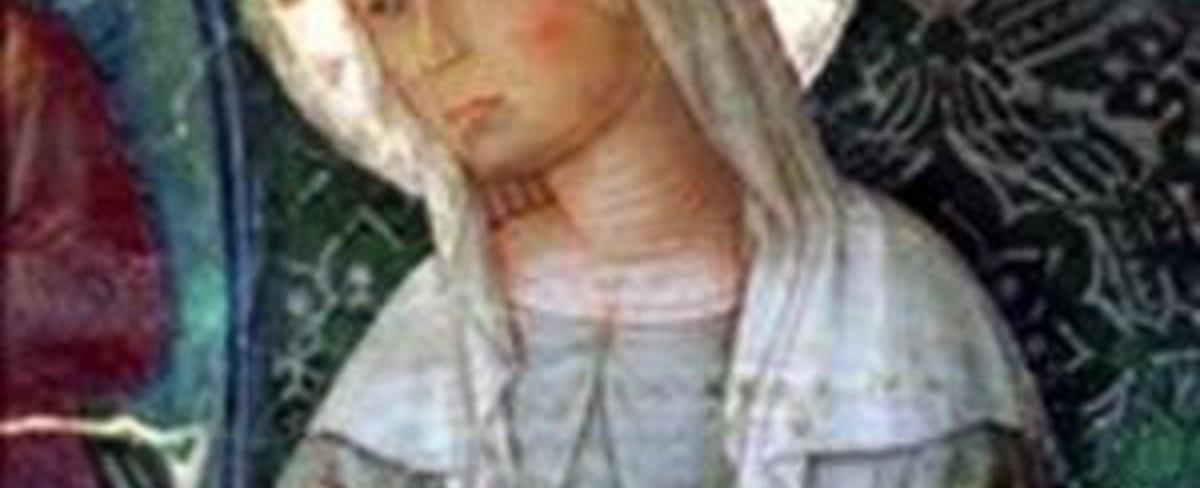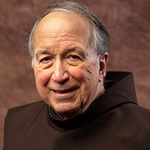Blessed Angelina of Montegiove: Medieval Franciscan Leader / Blessed Emmanuel Ruiz and Companion Martyrs: Victims of Religious and Ethnic Violence

On July 13, Franciscans honor a medieval Franciscan woman leader and a group of 19th-century Franciscan martyrs.
Encouraging young women to live celibate life
Blessed Angelina of Montegiove (1357-1435) was born to an aristocratic family near Orvieto, Italy. According to tradition, she was married to a nobleman in the Abruzzo who died soon after. She then joined the Brothers and Sisters of Penance (the "Third Order of St. Francis") and traveled about the region encouraging other young women to a dedicated celibate life.
Settling into life of prayer, simplicity, charity
About 1395, she settled in a small community of tertiary women, Sant' Anna, in Foligno, who were devoted to common prayer, a simple life, and works of charity.

Interior courtyard of monastery of Sant'Anna in Foligno, Italy.
Moving into leadership role
By the early 1400s, Angelina had moved into a leadership role in the community which gradually developed a more structured life and took formal religious vows while maintaining their life of active ministry, especially teaching. Art in the monastery features frescos of Martha and Mary, expressing the mixed active/contemplative nature of the community.
Serving as general minister
In 1428, a congregation was formed of several similar communities, and Angelina was chosen as general minister, the first of a Franciscan Third Order Regular congregation. Unfortunately, this development led to conflicts with the Observant Friars Minor who claimed supervision over the sisters, but the sisters reclaimed their independence.
Enduring violence, slaughter
Blessed Emmanuel Ruiz (1804-1860) and his companions were victims of religious and ethnic violence. In 1860, long-simmering political tensions between Maronite Catholics and the Druze sect exploded in civil war. In Northern Lebanon, Maronite peasants rose up against their Druze overlords; in southern Lebanon, the Druze began pillaging Maronite villages, killing more than 6,000 Christians. The slaughter reached Damascus on July 9, 1860, as Druze and Muslim paramilitary groups began attacking the Christian quarter of the city.

The Christian quarter of Damascus after the rioting of 1860.
Refusing to give up Catholic faith
Franciscan friars of the Custody of the Holy Land maintained a house in Damascus. As the mobs neared, Fr. Emmanuel, the guardian, a Spaniard, gathered his community, together with the schoolchildren, in the chapel. When the rioters broke in, they demanded that the eight friars give up their faith and embrace Islam. When the friars refused to do so, they all met terrible deaths. Most of the laypeople in the house escaped or were spared, but three lay Maronite Catholics, blood-brothers, shared the fate of the friars. Pope Pius XI beatified these eleven modern martyrs on October 10, 1926.

The Franciscan Church of St. Paul in Damascus today.
Remember that God is love
Let us call upon these Franciscan martyrs to intercede for peace among the still-embattled peoples of Syria, where so many people are victims of violence or have been forced into exile. May Muslims and Christians, both children of the one God, remember that God is love.
Dominic Monti, OFM
Professor of Franciscan Research in the Franciscan Institute of St. Bonaventure University
Dominic V. Monti, OFM, is a Franciscan Friar of Holy Name Province (USA) and currently professor of Franciscan Research in the Franciscan Institute of St. Bonaventure University. He devoted the greater part of his ministry to teaching the History of Christianity, in particular the history of the Franciscan movement. He has contributed two volumes to the Works of St. Bonaventure series and is author of Francis & His Brothers, a popular history of the Friars Minor.

